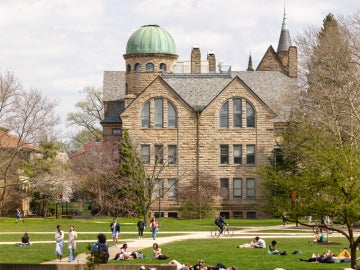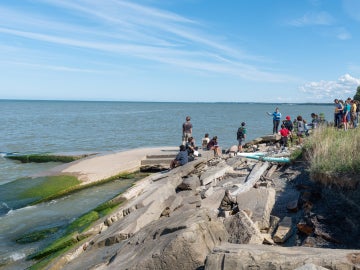A Conversation with Nora Gomringer, Max Kade Writer in Residence
November 18, 2019
Communications Staff

Poet, musical collaborator, and spoken-word artist Nora Gomringer is the 2019 Max Kade Writer in Residence.
Photo credit: Tanya Rosen-Jones ’97
This year, Oberlin celebrates its 50th year of the Max Kade Writer in Residence program. A centerpiece of the Department of German Language and Literatures, the artistic residency is a dynamic teaching and learning opportunity.
This year, Oberlin celebrates its 50th year of the Max Kade Writer in Residence program. A centerpiece of the Department of German Language and Literatures Department, the artistic residency serves as a dynamic teaching and learning opportunity.
In the 1967-68 academic year, the German department hosted Swiss-born author Kuno Raeber as its first Max Kade German Writer in Residence. With this invitation, the department was the first in the country to inaugurate such a program, made possible through the humanitarian vision and generosity of the Max Kade Foundation in New York. The program attracts critically acclaimed writers and spans a broad spectrum across the literary landscape.
Nora Gomringer is the Max Kade Writer in Residence for fall 2019. She has been publishing poetry since 2000, and she performs readings and musical collaborations. Her other works include short stories, radio plays, spoken texts, artist’s books, and musical projects. Since 2016, she has performed regularly with jazz drummer Philipp Scholz, presenting the duo’s program Peng Peng Peng, and the Dorothy Parker homage Peng Peng Parker. A regular columnist in print and radio, Gomringer lives in Bamberg, Germany.
Describe your role as German Writer in Residence at Oberlin.
Well, first of all: it's a blissful one! I am teaching one class per week and just gave a reading at the Max Kade House on campus. The idea of this very special and highly prestigious writer-in-residence-guest-professorship at Oberlin is to share insight into the individual poetic process, contextualise it within Germany's literature scene and traditions, and to encourage poetic thought and expression. That’s at least how I view my task at Oberlin.
In what ways are you teaching and interacting with students?
I ask students to use tactics of "guerilla poetry": To choose one or two poems and to place them on campus or somewhere in their personal space and then to take a picture of this setting. The text in a picture becomes a curated expression of their individual understanding of style, metaphor, and atmosphere. I am amazed at the level of German my 21 students in the course are speaking and writing in. They show great admiration and joy in learning the language.
You have published nine volumes of poetry and two volumes of essays, and you are also a spoken-word performer. What are your sources of inspiration for your writing?
To allow the world in, all conversations—the ones had and the ones simply overheard—all thoughts and good and ‘‘bad’’ feelings are important. Limitations can be set and have the power to make a writer quite agile in his/her thinking. But I believe it is important to see oneself as a permeable being, open and vulnerable to influences and people. How we then deal with everything is the expression of our ethics, how we then write about it is our poetics. I have a couple of special interests, though: bugs, monsters, trauma, fashion, all things Americana, and etymology.
Do you have any forthcoming works or projects on the horizon?
While in Oberlin I am completing an opera libretto. A commissioned work for a children’s opera, the premiere is in Dortmund April 2020. And I am putting together my new book which will be published in March 2020. I really am trying to make good use of my time while in Oberlin. I write, travel, and I appreciate the free time so very much, seeing it as a gift. In Germany, I am running a very demanding schedule; I am the director of one of Germany’s largest artist residencies, Internationales Künstlerhaus Villa Concordia, and I work and travel and perform as the freelance writer and poet that I am. So ... Oberlin will be forever in my memory as a place to catch my breath and recalibrate.
What do you think is the value of Max Kade residency program?
So far I have participated in three Max Kade residency programs. They are luxurious gifts of time and attention for the writers, and they adorn the German departments they are linked to with prestige and with a legacy of current writers whose influence is rather large in Germany. The students get to learn from and interact with a writing professional and hear the language they are striving to master used in more ways than conversation or academic discourse. They experience it as an active medium of art.
What have you enjoyed about your time in Oberlin?
My morning runs, the beef bowl at the Korean store and restaurant, hanging out at Ben Franklin, reading and writing at Blue Rooster, movie nights at the Apollo, lovely exchanges with all teaching colleagues, staff, and students, and insightful talks with Professor Steven Huff. And lastly, the Albino Squirrel Latte at Slow Train Cafe.
You may also like…
Oberlin Launches Critical AI Studies Minor in Fall 2026
With a solid foundation in both science and the humanities, this minor ensures students to understand and be able to analyze the ethical, cultural, environmental, political, economic, technological, and labor effects of AI.
Research Roundup
Every day, Oberlin’s faculty and students produce scholarly work that uncovers new insights into how we understand the world, particularly in the areas of sustainability and the environment.
Three Things with Jillian Scudder
Oberlin’s astrophysicist-author shines a light on our dark universe.


